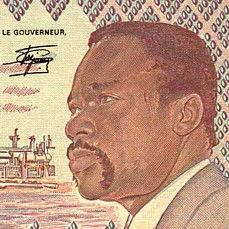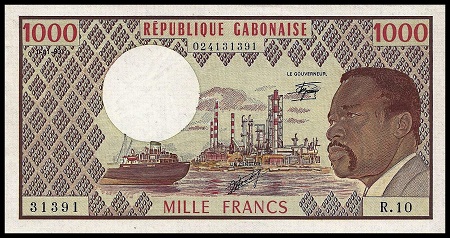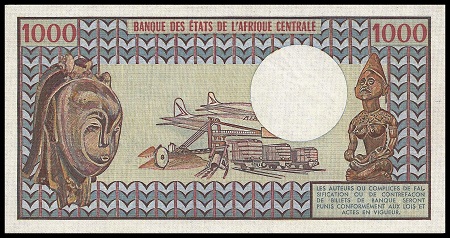GABON
Omar Bongo

Albert Bernard (Omar) Bongo was born in the town of Lewai, in what was then French Equatorial Africa on December 30, 1935. He was the last of 12 children his parents would have. He grew up in Brazzaville, and after his schooling he joined the military and served as a junior officer in the Air Force from 1958-1960, leaving the service when Gabon gained its independence. Though independent, French influence in Gabon would continue, as Gabon’s mineral and oil wealth were of prime importance to France.
When he left the military, Bongo entered the realm of politics and served under Gabon’s first president, Leon M’ba. Bongo’s political career took off, and he was able to attain the position of the Director of the Presidential Cabinet in two years’ time. He was captured along with President M’ba in an attempted coup in 1964, but they were rescued by the French military in just two days. His political climb continued and in 1965 he became a presidential representative in charge of defense. The next year he was appointed the Minister of Information & Tourism. This last appointment was choreographed by the French government who saw Bongo as the best replacement for an ailing and aging President M’ba. His position as Minister of Information & Tourism was held for only a few months when, in November 1966, he was appointed as Leon M’ba’s Vice President. Running unopposed in 1967, M’ba and Bongo won the presidential election, but the ailing Leon M’ba died of Cancer in November the same year. The day after M’ba died, Albert Bernard (Omar) Bongo succeeded him as the President of Gabon; He was 31 years old. The following spring, Bongo declared Gabon to be a one party state, which would help him hold onto his presidency, and he also changed the position of Vice President to Prime Minister. He held so tightly to his reign of power that he did not allow others to hold key ministry positions and, rather inadequately, performed those functions himself. In 1979, a call was made by his government to end his grip on the poorly run ministry positions and he relinquished his hold. He was re-elected as president the same year.
The French government which had been largely responsible for Bongo’s presidency was also responsible for much of Gabon’s aid. Over time, this aid helped Bongo to spend other monies on personal items and to further his political aims. He was responsible for very large campaign contributions to French politicians who were then indebted to him, and would be in a position to help continue funneling aid into Gabon. Financial functions seemed to be of a questionable nature when Bongo was involved with them.
Bongo’s reign was first criticized publicly in the 1980’s by a group known as MORENA (MO uvement RE dressement NA tional). Allegations of corruption and misappropriation of funds for personal use were lodged, including an over 2 million dollar interior design of a presidential plane. Many MORENA members were tried and sentenced to jail, but were soon pardoned. Quelling the opposition movement, Bongo was free to devote his time to his election in 1985, where he once again was elected. His hold to power through the one party system was soon challenged however, and in 1990, the country found itself suffering strikes and occasional riots. These pressures helped the government to adopt a multi-party system for the next election process.
And yet – Bongo won the next election.
But this time he won with only 51 % margin, as opposed the 99% margins he had enjoyed under his one party rule. Other positions that were won by opposition leaders in later elections were subsequently bought off by Bongo’s administration, which helped to assure his next re-election in 1998. Bongo was skilled at using the interests of others to further his own agenda and would ensnare opponents by offering governmental positions within his party. One favorite tactic he employed was to corrupt others by offering them concessions in oil profits. Once they were tainted, they no longer offered any problems.
Allegations of his corruption continued, including oil companies paying millions to gain rights to drill, embezzlement of public funds, etc. These claims were shunned by Bongo, but his extravagant lifestyle told another story. He had over 30 high-end properties in France alone. Scores of cars with payments linked directly to government accounts. Partners in oversees companies used to filter government funds were listed as some of his teenaged children. Family and friends were in top positions: his son Ali was the Minister of Defense. He and his family lived in extreme luxury, and were not afraid to flaunt it. Being in power so long with the assistance of the French government’s monetary and military aid likely helped Bongo’s corruption to go unchecked for so long. But in 2009, shortly before his death, the French froze his bank accounts.
Bongo wasn’t without his merits, however. Despite the obvious monetary, political and electoral corruption he employed, he did some good in his 4 decades of rule. He declared 10 percent of the counties lands as national parks that would remain pristine and were immune to exploitations of the lands for minerals, hunting or agriculture. Despite the many uprisings, especially after electoral results, Gabon under his rule never suffered from a coup, or war. He was also responsible for brokering a peace when Chad and Libya had a border dispute in 1978.
An obvious clue to his vanity, Omar Bongo had many things named after him including an airport, hospital, sports arenas, schools, etc. Perhaps the grandest namesake was when his hometown of Lewai was changed to Bongoville. Many texts refer to the fact that he was only five feet tall, which stands in stark contrast to his stature on the political stage. He converted to Islam in 1973 and changed his name to Omar Bongo, and in 2003 he added Ondimba, his late father’s name. When Fidel Castro relinquished his rule of Cuba to his brother, Omar Bongo became the longest serving ruler of a non-monarchal country.
At the age of 73, Omar Bongo died in June of 2009, while in Spain. He served as president of Gabon from 1967 – 2009. His death was listed by the French as occurring on June 7, and being a result of intestinal cancer, while the Gabonese government lists his death as being on June 8th, and caused by a heart attack. After Omar Bongo’s death, his son Ali Ben Bongo was elected president.
Omar Bongo’s image was placed on several Gabonese banknotes including:
1971 10,000 Francs
1974 and 1978 1,000 Francs
1974 and 1978 5,000 Francs
1974 and 1978 10,000 Francs
1986 and 1986 1,000 Francs

